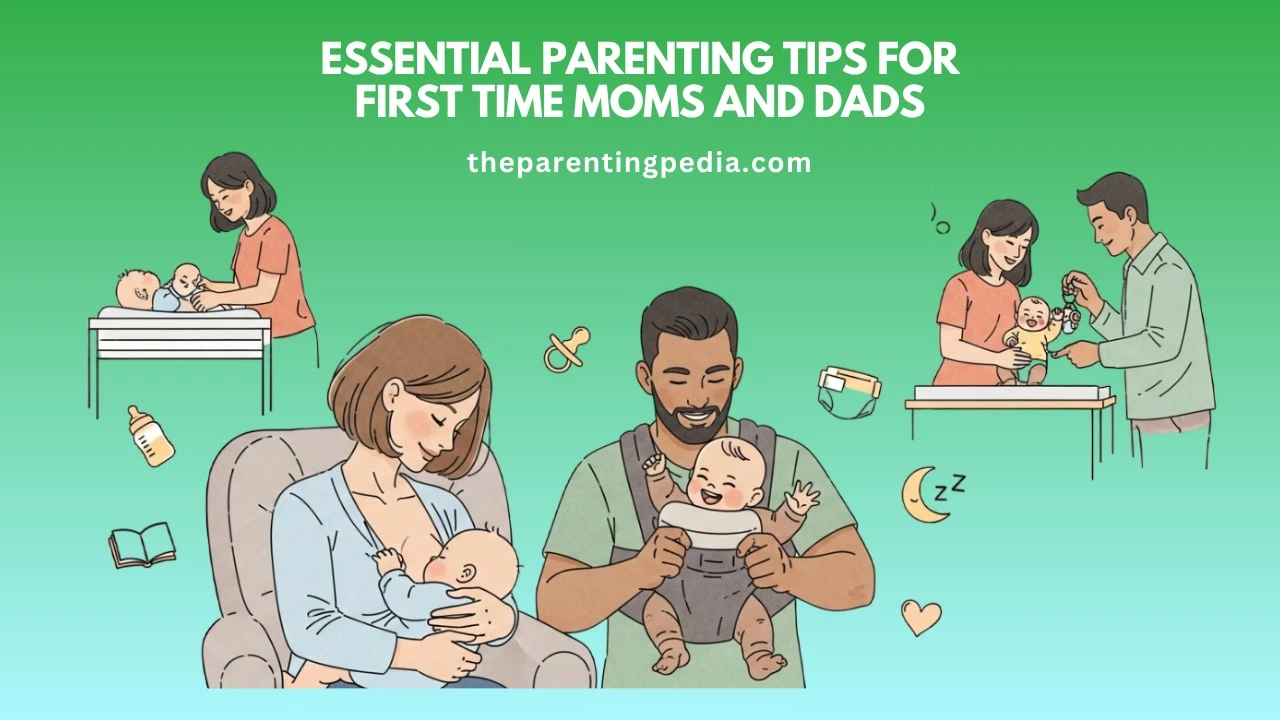Becoming a parent for the first time is both beautiful and chaotic. One moment there’s laughter and warmth, and the next there is panic over why the baby won’t stop crying at 3 a.m. Every new parent walks into this phase with hope, excitement and a fair amount of fear. However, learning a few parenting tips can make the journey smoother, calmer and far more rewarding. This article offers simple, practical guidance for first-time moms and dads who are figuring out how to care for their baby and themselves. Following are parenting tips for first time moms and dads that cover emotional readiness, daily routines, bonding and self-care, all explained in clear, relatable language.
1. Understanding That Perfection Is a Myth
The first and most important of all parenting tips is to let go of the idea of being a “perfect parent.” There will be mistakes, sleepless nights and moments of doubt. What matters more is love, consistency and presence. Babies don’t need flawless parents, they need responsive ones. When new parents accept that imperfection is part of the process, they free themselves from guilt and anxiety.
Parenting is not a performance. It is a relationship that grows and changes every day. First-time moms and dads who remind themselves of this truth will find peace in progress rather than perfection.
2. Building a Routine That Works
A steady routine helps babies feel safe and parents feel more in control. One of the most practical parenting tips is to create predictable patterns for feeding, sleeping and playtime. Babies thrive on familiarity. A calm, repetitive rhythm tells them the world is safe and dependable.
However, it is equally important to stay flexible. Babies grow fast and their needs change. A routine should serve as a guide, not a rulebook for baby. When parents learn to read their baby’s cues rather than follow rigid schedules, they start understanding what truly works for their family.
3. Sharing Responsibilities
Parenthood is a team effort. Another essential parenting tip is to share the load. When both parents take part in daily tasks like feeding, diaper changes, bedtime routines, it strengthens the bond between parent and child and between the couple themselves.
Sharing the load also helps prevent burnout. When one parent tries to do it all, exhaustion creeps in. Cooperation brings balance and reminds both parents they are in this together. Communication, patience and empathy are vital for both parents to maintain a healthy family.

4. Feeding with Love and Patience
Feeding a baby, whether through breastfeeding or bottle feeding is one of the most intimate moments of parenting. A key parenting tips here is to focus on connection, not comparison. Every baby feeds differently. Some eat quickly; others take their time.
Moms often feel pressure to breastfeed perfectly or worry about not producing enough milk. Dads may feel unsure about how to help. The best approach is teamwork. The feeding time should be peaceful, filled with eye contact, gentle words and patience. What matters most is that the baby feels safe and loved during every meal.
5. Prioritizing Sleep for Everyone
Sleep deprivation is common issue of early parenthood. Babies wake up often and so do parents. One of the most practical parenting tips for new moms and dads is to sleep when the baby sleeps no matter how tempting it is to do chores instead.
Creating a calm sleep environment helps both baby and parents rest better. Keeping the lights low, avoiding overstimulation before bedtime and maintaining a gentle routine can improve sleep quality. Over time, babies learn to associate these signals with rest and parents get a few more precious hours of peace.
According to experts at the Mayo Clinic, first-time parents often struggle
with sleep deprivation, and sharing nighttime duties can help
both partners manage exhaustion more effectively.
6. Encouraging Bonding and Play
Bonding doesn’t happen all at once, it grows through everyday moments. Among the most heartwarming parenting tips is to play and talk with the baby often. Simple actions like singing, reading or making funny faces strengthen emotional connection and support healthy development.
Also Read: Understanding Symptoms Of Depression In Teenagers
Skin-to-skin contact, soft talking and gentle touch help the baby feel secure. Dads can bond just as strongly as moms through these interactions. Every smile, cuddle and giggle builds trust and love between child and parents. These are the invisible threads that form the foundation of a happy, confident child.
7. Managing Stress and Mental Health
Parenthood brings joy, but it can also bring anxiety and stress. One of the most important parenting tips for first-time parents is to take mental health seriously. Fatigue, hormonal changes and constant responsibility can be overwhelming. It is normal to feel tired, emotional or even unsure.
Parents should not hesitate to ask for help from family, friends or professionals. A healthy parent is the best gift a child can have. Taking breaks, practicing self-care and staying connected with others are vital parts of good parenting. Parents should remember that asking for support is not weakness, it is wisdom.
8. Limiting Screen Time and Distractions
In today’s digital age, parents often get lost in internet suggestions from checking baby advice online or scrolling through endless pictures. A helpful parenting tips is to put the phone away during bonding time. Babies notice when parents are distracted, even at a young age.
Instead, parents should focus on being present for child. Watch the baby’s expressions, listen to their sounds and enjoy real-life moments. These memories are worth more than any online update or suggestion technology can provide.
9. Learning Through Observation
Every baby is unique. A valuable parenting tip is to observe before reacting. Babies communicate through movements, cries and expressions. When parents slow down and watch closely, they begin to understand what their child needs.
Some cries mean hunger, others mean discomfort or boredom. Learning these signals takes time, but with patience, it becomes second nature. This understanding makes parenting less about guessing and more about genuine connection.
The American Psychological Association (APA) emphasizes that
building emotional resilience in parents directly supports children’s
ability to handle stress and develop confidence.
10. Creating a Support Network
No parent should walk this road alone. One of the best parenting tips is to build a support system early like family, friends or parent groups. Sharing experiences helps parents realize they are not the only ones facing challenges.
Support from friends or family also provides practical help like babysitting or simply listening when things get tough. Surrounding oneself with positive, understanding people makes the parenting journey more joyful and less isolating.
11. Keeping Health and Safety a Priority
Parenting also means constant vigilance. A critical parenting tip is to stay informed about the baby’s health needs like vaccinations, check-ups, hygiene and safety at home. Creating a baby-proof space prevents accidents and gives peace of mind.
Parents should also trust their instincts regarding baby. If something feels off, consult a doctor. No question is too small when it comes to a baby’s wellbeing. Being proactive builds confidence and ensures the child grows in a safe environment.
12. Remember to Enjoy the Journey
Amid all the advice and responsibilities, one last parenting tip is to pause and enjoy it. Babies grow faster than anyone expects. The sleepless nights will fade and one day, parents will miss the tiny fingers wrapped around theirs. Capturing small moments, laughing through the mess and celebrating small milestones, these are what make parenthood meaningful. There is no perfect formula, but there is love, effort and growth.

Conclusion
First-time moms and dads often worry about getting everything right. But successful parenting isn’t about perfection, it is about presence, patience and persistence. By following these parenting tips, parents can navigate the early stages with more confidence and calm. Parenting transforms people, it teaches empathy, endurance and unconditional love. The journey will be tiring, messy and sometimes confusing, but it will also be filled with laughter, wonder and pride. Every parent learns by doing, and every child teaches their parents something new. With the right parenting tips, a little patience and a lot of heart, first-time moms and dads can raise happy, healthy children while growing stronger themselves.
FAQ
What is the best advice for first time parents?
Parents should relax and trust their instincts. They don’t need to be perfect. Focus on loving the baby, sharing responsibilities, resting whenever possible, asking for help and enjoying each small moment together.
What do first time moms struggle with?
First-time moms often struggle with sleepless nights, breastfeeding challenges, self-doubt, body changes, mood swings and balancing baby care with self-care while learning to trust their instincts and find confidence.
What is the best advice for first time parents?
Top Tips for New Parents
> Expect stress. Becoming a parent is a major life transition. …
> Join a new parents group. It doesn’t have to be specific to your . . > life situation. …
> Accept help. …
> Believe in yourself. …
> Forgive yourself. …
> Review and revise your expectations of yourself. …
> Ask questions. …
> Remember who you used to be.
What not to do as a first time mom?
Never shake your baby, whether in play or in frustration. Shaking can cause bleeding in the brain and sometimes death. If you need to wake your baby, don’t do it by shaking. Instead, tickle your baby’s feet or blow gently on a cheek.
What do first time parents struggle with the most?
Emotional and mental health
Many new parents experience the “baby blues,” characterised by mood swings, anxiety, sadness, and difficulty bonding with their baby, usually peaking within the first few weeks postpartum.
External references: Content insights sourced from Mayo Clinic and the American Psychological Association to ensure accuracy and expert-backed parenting advice.
